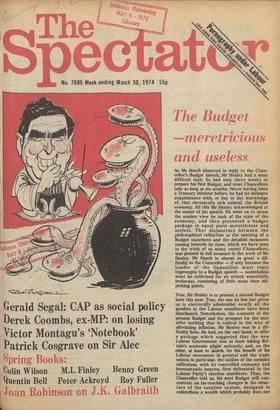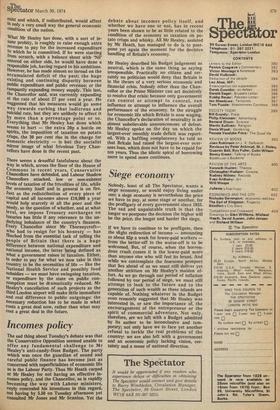The Budget —meretricious and useless
As Mr Heath observed in reply to the Chancellor's Budget speech, Mr Healey had a most difficult task: he had only three weeks to prepare his first Budget, and most Chancellors take as long as six months. Never having been a Treasury minister before, he had no intimate acquaintance with, or day to day knowledge of, that chronically sick animal, the British economy. All this Mr Healey acknowledged at the outset of his speech. He went on to stress the sombre view he took of the state of the economy, and then presented a budget package in equal parts meretricious and useless. That disjuncture between the philosophical reflection at the opening of a Budget statement and the detailed measures coming towards its close, which we have seen in the work of so many recent Chancellors, was present in full measure in the work of Mr Healey. Mr Heath in almost as great a difficulty as the Chancellor — if only because the Leader of the Opposition must reply impromptu to a Budget speech — nonetheless must be criticised for an attack essentially irrelevant, consisting of little more than nitpicking points.
True, Mr Healey is to present a second Budget later this year. True, the one he has just given us is electorally admirable: nearly all the goodies in the Labour manifesto have been distributed. Nonetheless, the contents of the present Budget and the prospect for the next offer nothing that is radical in the way of alleviating inflation. Mr Healey was in a difficulty here. He had, on the one hand, to offer a package which suggested that the new Labour Government was at least taking Britain's economic plight seriously; and, on the Other, at least to sketch, for the benefit of the Labour movement in general and the trade unions in particular, the outline of the socialist rnillenium, with its controlled economy and bureaucratic heaven, first delineated in the Labour Party's election manifesto. Thus, the Chancellor told us, his next Budget will concentrate on far-reaching changes in the structure of the taxation system, designed to redistribute a wealth which probably does not exist and which, if redistributed, would affect lo only a very small way the general economic condition of the nation.
What Mr Healey has done, with a sort of insane probity, is roughly to raise enough extra revenue to pay for the increased expenditure to which he is committed. If he were starting from scratch, with a balance sheet with 'Nil' entered on either side, he would have done a responsible job, having regard to his ambitions. However, he has made almost no inroad on the accumulated deficit of the past; the huge existing and continuing disparity between Public expenditure and public revenue; or the rampantly expanding money supply. This last, the Chancellor said, was currently expanding at the rate of about 27 per cent a year. He suggested that his measures would go some Way towards curbing that ludicrous and suicidal rate, but they are unlikely to affect it by more than a percentage point or so. Everything that Mr Healey has done which seems to hurt — the extra 20p a bottle on Spirits, the imposition of taxation on potato crisps, the 30 per cent rise in the charge for domestic electricity — is but the socialist mirror image of what frivolous Tory Chancellors have done in the recent past.
There seems a dreadful fatefulness about the way in which, across the floor of the House of Commons in recent years, Conservative Chancellors have defended, and Labour Shadow Chancellors attacked, low or non-existent levels of taxation of the frivolities of life, while the economy itself and in general is on fire. Just as the redistribution of every piece of capital and all incomes above 00,000 a year would help scarcely at all the poor and the needy, so the question of whether, and at what level, we impose Treasury surcharges on luxuries has little if any relevance to the underlying imbalance of the country's finances. Every Chancellor since Mr Thorneycroftw.ho had to resign for his honesty — has flinched from the essential task of telling the People of Britain that there is a huge difference between national expenditure and national income, the latter being defined as What a government raises in taxation. Either, in order to pay for what we now take in this country to be the necessities of life — like the National Health Service and possibly food subsidies — we must have swingeing taxation, or expenditure by the state on public consumption must be dramatically reduced. Mr Healey's cancellation of such projects as the third London airport will make little immediate and real difference to public outgoings: the necessary reduction has to be made in what costs a great deal now, rather than what may cost a great deal in the future.
Incomes policy
The sad thing about Tuesday's debate was that the Conservative Opposition seemed unable to Offer any fundamental challenge to Mr Healey's anti-candy-floss Budget. The party Which was once the guardian of sound and careful public finance has become just as concerned with superficialities of economic life as is the Labour Party. Thus Mr Heath carped at Mr Healey for not having an effective incomes policy, and the Chancellor, as is rapidly becoming the way with Labour ministers, coyly concealed his intentions in this regard, not having by 5.50 on Tuesday afternoon yet consulted Mr Jones and Mr Scanlon. Yet the debate about incomes policy itself, and whether we have one or not, has in recent years been shown to be as little related to the condition of the economy as taxation on potato crisps and whisky. All Mr Healey, assisted by Mr Heath, has managed to do is to postpone yet again the moment for the decisive handling of Britain's economy.
Mr Healey described his Budget judgement as neutral, which is the same thing as saying irresponsible. Practically no citizen and certainly no politician would deny that Britain is in the throes of a very serious economic and financial crisis. Nobody other than the Chancellor or the Prime Minister can act decisively to resolve that crisis: because only government can control or attempt to control, can influence or attempt to influence the overall performance of the economy. In the struggle for economic life which Britain is now waging, the Chancellor's declaration of neutrality is an almost unbelievable announcement of defeat. Mr Healey spoke on the day on which the largest-ever monthly trade deficit was reported. With a baffling complacency he told us that Britain had raised the largest-ever overseas loan, which does not have to be repaid for ten years. Thus the idiotic spiral of borrowing more to spend more continues.
Siege economy
Nobody, least of all The Spectator, wants a siege economy, or would enjoy living under one: a siege economy is nevertheless the price we have to pay, at some stage or another, for the profligacy of every government since 1955. The sad and unpalatable truth is that the longer we postpone the decision the higher will be the price, the longer and harder the siege.
If we have to continue to be profligate, then the slight redirection of income — amounting to about 85p a week for lower-paid workers — from the better-off to the worse-off is to be welcomed. But, of course, when the horrendous crash comes it is the lower-paid more than anyone else who will feel its brunt. And while we contemplate the fearsome prospect that lies ahead of us we must still deliver yet another stricture on Mr Healey's maiden effort. As we go through our period of inflation followed by our period of siege, we must still attempt to look to the future and to the generation of such wealth as these islands are capable of. Nothing whatever in the Budget even remotely suggested that Mr Healey was interested in, or saw the importance of, the encouragement of the entrepreneur or the spirit of commercial adventure. Not only, therefore, are we left with a Budget admitted by its author to be inconclusive and temporary; not only have we to face yet another refusal to tackle the real problems of the country: we are also left with a government and an economic policy lacking vision, certainty and a sense of national direction.



































